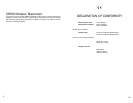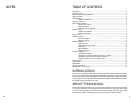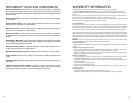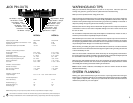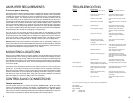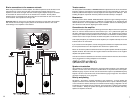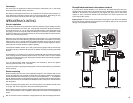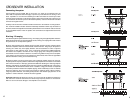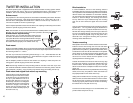
6
15
AMPLIFIER REQUIREMENTS
A note on power handling
The HCCA component system requires a minimum of 20 Watts per channel to achieve reasonable
listening volumes in a moving automobile without clipping the amplifier. Orion recommends
150 Watts per channel as a maximum so as not to exceed the thermal or mechanical limitations
of the speaker system. Any amplifier between 20 watts and 100 watts per channel may be
used. If you choose to use an amplifier with more power than 100 Watts be very careful, you
can damage the speaker system if played too loud.The HCCA components produce reasonable
volume levels in the automotive environment using moderate amplifier power. However, the
use of a low powered amplifier to try and attain very high volume levels can lead to overdriving
the amplifier. This will generate high distortion levels which can easily damage loudspeakers,
even when the amplifier’s rated power is far below the maximum rated power of the loudspeaker.
Underpowering a driver is every bit as damaging as overpowering it.
As a rule, do not turn the volume up above the point where you hear distortion on musical
peaks from either an overdriven amplifier or mechanical noise from an overstressed speaker. For
the best performance and reliability, select an amplifier with slightly more than the maximum
power you are likely to need to generate the desired volume levels. This margin of reserve
power will ensure that the amplifier will not attempt to deliver more than its design allows.
Warning: Practice safe sound! Excessive sound pressure level can permanently damage your
hearing. The maximum volume levels attainable with high performance Orion speakers, combined
with high-power amplification, may exceed safe levels for extended listening. When listening at
high volume levels always use hearing protection or turn it down!
MOUNTING LOCATIONS
There are many possible choices of mounting locations. The automobile factory locations will
usually dictate the woofer mounting position. Because of its small size and multiple mounting
options, the tweeter can go virtually anywhere. Orion uses an unusually low crossover frequency
for the tweeter which means you are not restricted to mounting the tweeter close to the midrange.
The tweeter can be mounted as far as 24" from the midrange without causing adverse effects
on the sound quality.
Orion cannot recommend specific locations for the tweeter for each car, but we can give some
general tips. Try to keep the tweeters as far to the sides of the car as practical, avoid placing
them above ear level unless the woofers are also above ear level. Place the tweeters in similar
locations on both sides. Try a few locations by just placing the tweeter or taping it in a location
and listening to ensure the desired stereo image and high frequency dispersion are achieved
before committing to a location by drilling holes in the automobile.
CONTROLS AND CONNECTIONS
Tweeter level control
The three position switch in the crossover box labeled “TWEETER LEVEL” adjusts the relative
volume of the tweeter with respect to the midrange. The 0dB position is referenced as equal
output from the midrange and tweeter. The -3dB and -6dB positions offer -3dB and -6dB less
output from the tweeter respectively. Tweeter level can be adjusted independently for right and
left channels to compensate for different listening tastes and mounting locations.
TROUBLESHOOTING
Symptom Probable cause Remedy
No output Source or amplifier not turned on Check source or amplifier and fix as
needed
Audio input not connected or no Check RCA connections and signal
output from source integrity, fix or replace as needed
Protection circuit activated turn down volume. Protection will self
reset
Speaker wires not connected Check speaker wires and fix or replace as
needed
Audio cycles on and off Speaker damaged Check system with known working
speaker and fix or replace as needed
Thermal protection engaged check that amplifier has adequate
ventilation check speaker impedance
load
Loose or poor audio input Check RCA, power and speaker
connections and repair or replace as
needed
Distorted output Preamp volume set too high. Check volume of preamp and adjust
exceeding maximum capability appropriately
of amplifier.
Impedance load to amplifier too low Check speaker impedance load, if below
1 ohm rewire the speakers to achieve a
higher impedance
Shorted speaker wires Check speaker wire connections and
repair or replace as needed
Speaker not connected properly Check speaker wiring and repair or
replace as needed. refer to the speaker
wiring section of this manual for detailed
instructions
Speaker damaged Check system with known working
speaker and fix or replace as needed
Poor bass response Speakers wired with wrong polarity Check speaker polarity and fix as needed
causing cancellation at low frequencies
Lack of stereo separation Speakers wired with wrong polarity. Check speaker polarity and fix as needed
stereo / bridge switch set to bridge set switch to stereo position
position
Speaker connected across wrong Check that the speaker wires are not
output terminals connected to the bridged terminals and
fix as needed
Source set to mono Check source and adjust controls as
needed
If you want to consult the factory, write or call our customer service department:
Orion Industries
9235 S. McKemy Street
Tempe. AZ 85284
Phone: (480)705-5600
Fax: (480)705-7339




